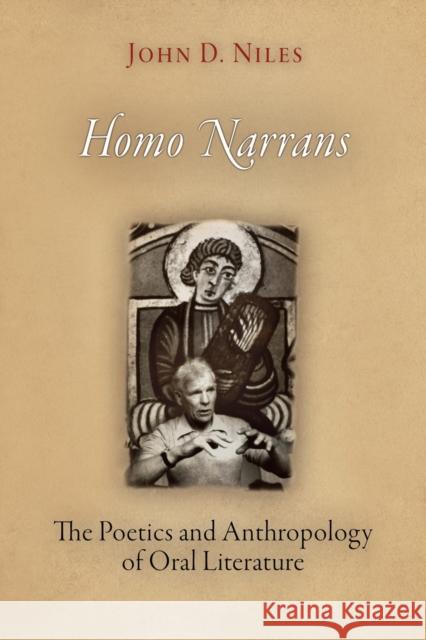Homo Narrans: The Poetics and Anthropology of Oral Literature » książka
Homo Narrans: The Poetics and Anthropology of Oral Literature
ISBN-13: 9780812221077 / Angielski / Miękka / 2010 / 296 str.
Homo Narrans The Poetics and Anthropology of Oral Literature John D. Niles Awarded second place in the 2000 Chicago Folklore Prize competition "Linking the performed word of the present with the textual record of the past, Homo Narrans brings together, in mutually productive ways, what have often been contrasted--folklore and literature. This readable and accessible exploration suggests that narrative and narrating are essential ways humanity fashions and refashions itself."--Mary Ellen Brown, Indiana University "A well-documented and unusually readable and sensible synthesis of much of the work that has been done on oral culture."--MLR "A welcome interweaving of areas too often and too simplistically segregated: folklore and literature, oral tradition and written tradition, performance and text."--Choice It would be difficult to imagine what human life would be like without stories--from myths recited by Pueblo Indian healers in the kiva, ballads sung in Slovenian market squares, folktales and legends told by the fireside in Italy, to jokes told at the dinner table in Des Moines--for it is chiefly through storytelling that people possess a past. In Homo Narrans John D. Niles explores how human beings shape their world through the stories they tell. The book vividly weaves together the study of Anglo-Saxon literature and culture with the author's own engagements in the field with some of the greatest twentieth-century singers and storytellers in the Scottish tradition. Niles ponders the nature of the storytelling impulse, the social function of narrative, and the role of individual talent in oral tradition. His investigation of the poetics of oral narrative encompasses literary works, such as the epic poems and hymns of early Greece and the Anglo-Saxon Beowulf, that we know only through written text but that are grounded in oral technique. That all forms of narrative, even the most sophisticated genres of contemporary fiction, have their ultimate origin in storytelling is a point that scarcely needs to be argued. Niles's claims here are more ambitious: that oral narrative is and has long been the chief basis of culture itself, that the need to tell stories is what distinguishes humans from all other living creatures. John D. Niles is Professor of English at the University of California at Berkeley. He is the author and editor of many books, including Beowulf: The Poem and Its Tradition and coeditor, with Allen J. Frantzen, of Anglo-Saxonism and the Construction of Social Identity. 1999 296 pages 6 x 9 15 illus. ISBN 978-0-8122-2107-7 Paper $24.95s 16.50 World Rights Anthropology, Literature Short copy: Homo Narrans explores how human beings shape their world through the stories they tell. Author John D. Niles ponders the nature of the storytelling impulse, the social function of narrative, and the role of individual talent in oral tradition.
Homo NarransThe Poetics and Anthropology of Oral LiteratureJohn D. NilesAwarded second place in the 2000 Chicago Folklore Prize competition"Linking the performed word of the present with the textual record of the past, Homo Narrans brings together, in mutually productive ways, what have often been contrasted--folklore and literature. This readable and accessible exploration suggests that narrative and narrating are essential ways humanity fashions and refashions itself."--Mary Ellen Brown, Indiana University"A well-documented and unusually readable and sensible synthesis of much of the work that has been done on oral culture."--MLR"A welcome interweaving of areas too often and too simplistically segregated: folklore and literature, oral tradition and written tradition, performance and text."--ChoiceIt would be difficult to imagine what human life would be like without stories--from myths recited by Pueblo Indian healers in the kiva, ballads sung in Slovenian market squares, folktales and legends told by the fireside in Italy, to jokes told at the dinner table in Des Moines--for it is chiefly through storytelling that people possess a past.In Homo Narrans John D. Niles explores how human beings shape their world through the stories they tell. The book vividly weaves together the study of Anglo-Saxon literature and culture with the author's own engagements in the field with some of the greatest twentieth-century singers and storytellers in the Scottish tradition. Niles ponders the nature of the storytelling impulse, the social function of narrative, and the role of individual talent in oral tradition. His investigation of the poetics of oral narrative encompasses literary works, such as the epic poems and hymns of early Greece and the Anglo-Saxon Beowulf, that we know only through written text but that are grounded in oral technique.That all forms of narrative, even the most sophisticated genres of contemporary fiction, have their ultimate origin in storytelling is a point that scarcely needs to be argued. Niles's claims here are more ambitious: that oral narrative is and has long been the chief basis of culture itself, that the need to tell stories is what distinguishes humans from all other living creatures.John D. Niles is Professor of English at the University of California at Berkeley. He is the author and editor of many books, including Beowulf: The Poem and Its Tradition and coeditor, with Allen J. Frantzen, of Anglo-Saxonism and the Construction of Social Identity.1999 | 296 pages | 6 x 9 | 15 illus.ISBN 978-0-8122-2107-7 | Paper | $24.95s | L16.50 World Rights | Anthropology, LiteratureShort copy:Homo Narrans explores how human beings shape their world through the stories they tell. Author John D. Niles ponders the nature of the storytelling impulse, the social function of narrative, and the role of individual talent in oral tradition.











